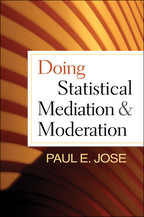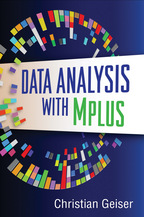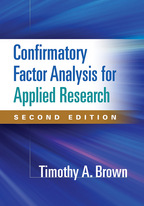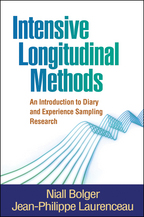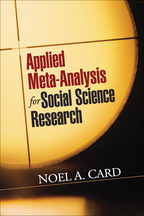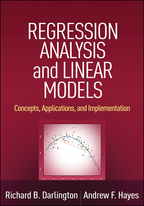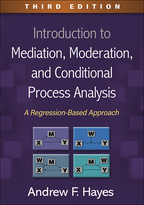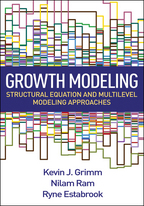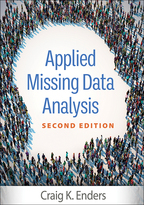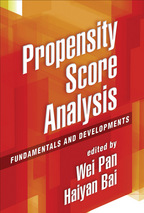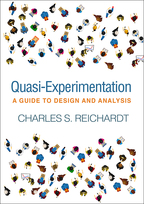Doing Statistical Mediation and Moderation
Paul E. Jose
HardcoverPaperbacke-bookprint + e-book
Hardcover
orderMarch 28, 2013
ISBN 9781462508211
Price: $96.00 336 Pages
Size: 6⅛" x 9¼"
Paperback
orderMarch 29, 2013
ISBN 9781462508150
Price: $64.00336 Pages
Size: 6⅛" x 9¼"
Read the Series Editor's Note by Todd D. Little
“This book offers a brief and readable introduction to moderation and mediation, including alternate contexts in which such effects are likely to emerge, statistical strategies for their evaluation, and different types of models that represent manifestations of mediation and moderation. The focus on and clarification of the difference between mediation and moderation distinguish this contribution from the other most recent publications in this area….For the person wanting a comprehensive introduction to themes associated with the concepts of mediation and moderation, Doing Statistical Mediation and Moderation represents a worthwhile addition to one's library. The variety of topics covered…is impressive….Throughout, Jose offers a slew of online resources for learning more about special topics in mediation and moderation and for conducting analyses….A useful contribution to the literature on more sophisticated structural models. Researchers who are interested in improving their effectiveness as modelers of relationships involving three or more variables will find it a valuable contribution as an introduction to the broad conceptual issues related to mediation and moderation, and as a source of useful tools and resources.”

—PsycCritiques
“A really nice aspect of the book is that the author provides all the datasets analyzed, allowing the readers to directly use them to learn and practice. In the appendices, the book provides suggested answers to the exercises, statistical software implementations, and Internet resources for mediation and moderation analysis….This book is an excellent introductory level mediation and moderation analysis textbook….It clearly explains the basic research questions and the corresponding regression-based statistical tools dealing with them. Applied researchers interested in applying linear regression-based mediation and moderation techniques to their own data could find an excellent starting point within its pages.”

—American Statistician
“The examples are great and are used effectively. In the basic model chapters, readers can learn from these examples about how to actually fit these models, how to read and interpret the output, and, most important, the right language to report the findings. The book's emphasis on using graphs to visualize model results will make it easier for novices to grasp subtle concepts and avoid pitfalls. The author's MedGraph and ModGraph are great tools. I would consider using this book as a supplement in an advanced statistics class. Its conversational style will complement the more formal presentation of most textbooks.”

—Maria M. Wong, PhD, Department of Psychology, Idaho State University
“Jose has done a terrific job of laying out the importance of investigating mediation and moderation effects, as well as providing strategies to address them. Strengths of this clearly written book include the link between mediation and moderation theory and the statistical analysis testing these theories. The examples will prove useful to researchers in many fields.”

—David MacKinnon, PhD, Department of Psychology, Arizona State University
“One of the first volumes to focus on mediation and moderation, this book explains their differences from historical, substantive, and modeling perspectives. It is abundant with 'how-to' examples and provides readers with modeling tools that can be used directly in research. This is a suitable supplemental text for intermediate or advanced courses dealing with regression, hierarchical linear modeling, or structural equation modeling. The inclusion of cutting-edge topics such as mediated moderation and moderated mediation will attract more advanced quantitative researchers as well.”

—Feifei Ye, PhD, Department of Psychology in Education, University of Pittsburgh
—PsycCritiques
“A really nice aspect of the book is that the author provides all the datasets analyzed, allowing the readers to directly use them to learn and practice. In the appendices, the book provides suggested answers to the exercises, statistical software implementations, and Internet resources for mediation and moderation analysis….This book is an excellent introductory level mediation and moderation analysis textbook….It clearly explains the basic research questions and the corresponding regression-based statistical tools dealing with them. Applied researchers interested in applying linear regression-based mediation and moderation techniques to their own data could find an excellent starting point within its pages.”
—American Statistician
“The examples are great and are used effectively. In the basic model chapters, readers can learn from these examples about how to actually fit these models, how to read and interpret the output, and, most important, the right language to report the findings. The book's emphasis on using graphs to visualize model results will make it easier for novices to grasp subtle concepts and avoid pitfalls. The author's MedGraph and ModGraph are great tools. I would consider using this book as a supplement in an advanced statistics class. Its conversational style will complement the more formal presentation of most textbooks.”
—Maria M. Wong, PhD, Department of Psychology, Idaho State University
“Jose has done a terrific job of laying out the importance of investigating mediation and moderation effects, as well as providing strategies to address them. Strengths of this clearly written book include the link between mediation and moderation theory and the statistical analysis testing these theories. The examples will prove useful to researchers in many fields.”
—David MacKinnon, PhD, Department of Psychology, Arizona State University
“One of the first volumes to focus on mediation and moderation, this book explains their differences from historical, substantive, and modeling perspectives. It is abundant with 'how-to' examples and provides readers with modeling tools that can be used directly in research. This is a suitable supplemental text for intermediate or advanced courses dealing with regression, hierarchical linear modeling, or structural equation modeling. The inclusion of cutting-edge topics such as mediated moderation and moderated mediation will attract more advanced quantitative researchers as well.”
—Feifei Ye, PhD, Department of Psychology in Education, University of Pittsburgh

